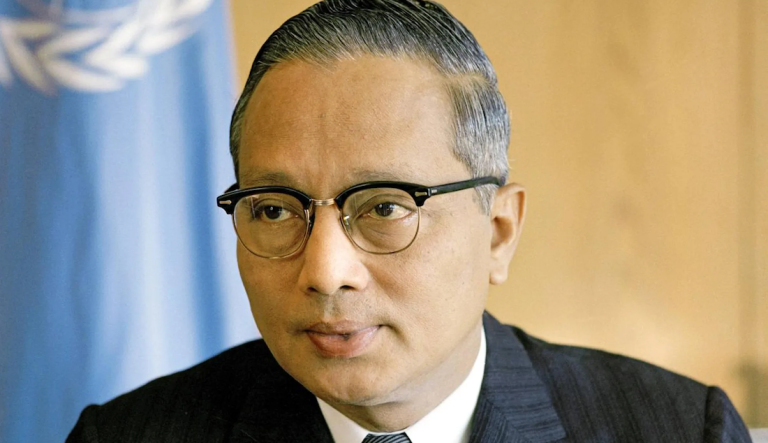
New York, N.Y. — In the quiet town of Pantanaw, a remarkable journey began with the birth of U Thant.
The son of a respected landowner and rice merchant, U Thant would go on to become a pivotal figure on the world stage, remembered for his wisdom, diplomacy, and unwavering commitment to peace.
Humble Beginnings, Steadfast Values
U Thant was one of four sons, raised in a family that valued education and service. After excelling at Rangoon University College, he returned to his hometown, where he taught at the National School and later served as headmaster by the age of 25. It was during these formative years that he befriended Burma’s future prime minister, U Nu, forging a partnership that would shape his destiny.
Rising Through the Ranks: From Burma to the United Nations
In 1948, U Nu recognized U Thant’s exceptional abilities and appointed him as his secretary. U Thant quickly became known for his eloquence, organizational skills, and diplomatic acumen. He arranged travel, crafted speeches, and welcomed foreign dignitaries, all while serving as secretary of the first Asian-African Conference in 1955-a pivotal event that led to the Non-Aligned Movement.
Between 1957 and 1961, U Thant represented Burma at the United Nations, where he played a crucial role in negotiations for Algerian independence. His calm demeanor and thoughtful approach earned him respect from colleagues around the globe.
A Leader in Times of Crisis
Tragedy struck in 1962 when U.N. Secretary-General Dag Hammarskjöld died in a plane crash. The world was in mourning, and the United Nations faced uncertainty. In this moment of crisis, the Security Council unanimously selected U Thant to serve as acting Secretary-General. He became the first non-European to hold this esteemed position, guiding the organization with a steady hand.

U Thant’s leadership was quickly put to the test. During his first term, he helped defuse the Cuban Missile Crisis by facilitating negotiations between U.S. President John F. Kennedy and Soviet Premier Nikita Khrushchev.
His diplomatic finesse played a crucial role in preventing a global catastrophe. In December 1962, he also instituted Operation Grand Slam, which averted civil war in Congo.
Recognizing his exceptional service, the United Nations re-elected U Thant to a second term. He continued to champion peace, understanding, and cooperation among nations.
Championing Decolonization and Development
During his tenure, U Thant oversaw the admission of dozens of new Asian and African states to the United Nations, reflecting his deep commitment to decolonization and self-determination. He supported the Vietnam War peace process and established key agencies to address global challenges, including the United Nations Institute for Training and Research (UNITAR) and the United Nations Conference on Trade and Development (UNCTAD).
U Thant believed that economic cooperation and sustainable development were essential for lasting peace. Under his guidance, UNCTAD became a vital platform for promoting fair international trade and economic growth, particularly for developing countries.
A Legacy of Inspiration
U Thant’s vision extended beyond politics and economics. He was a passionate advocate for education and human rights, emphasizing the importance of understanding and empathy. On the 100th anniversary of his birth, his words still resonate: “Every human being, of whatever origin, of whatever station, deserves respect. We must each respect others even as we respect ourselves.”
He also famously stated at the U.N.’s 15th anniversary: “Wars begin in the minds of men, and in those minds, love and compassion would have to be built as defenses against war.”
Honoring a Global Statesman
U Thant’s contributions were recognized worldwide. In 1969, he welcomed the Apollo 11 astronauts at the United Nations, celebrating humanity’s achievements and the spirit of international cooperation. His legacy is honored through commemorative events and his enduring influence on the U.N.’s mission.
A Lasting Impact
After retiring from the U.N., U Thant continued to inspire as a senior advisor and thought leader. The United Nations Development Programme (UNDP), established during his tenure, remains a testament to his belief that every nation’s citizens deserve the opportunity to fulfill their potential.
Today, U Thant is remembered not only as a skilled diplomat but as a compassionate human being whose life’s work was dedicated to building a more just, peaceful, and equitable world. His journey from the rice fields of Pantanaw to the halls of the United Nations serves as a beacon of hope for future generations.
U Thant’s legacy endures-a reminder that with vision, empathy, and determination, one person can truly make a difference in the world.